







Managing Editor
Sarath Shyam
Consultant Editors
Dr. John Andrews
Emma James
Andrew Scott
Naomi Wilson
Stanly Lui
Joseph Alex
Creative Consultants
Charlie Jameson
Edwards Gonzalez
Branding & Marketing Partnerships
Jennifer Anderson
Alice Smith Monica Davis
Anna Elza
Enquiry
admin@highereducationdigest.com
Free Subscription
July 2023 Vol - 5 Issue - 8
Remarkable North American Colleges and Universities to Watch in 2023
International Representation
Americas 16192 Coastal Highway, Lewes, DE 19958, USA
Europe
27, Old Gloucester Street, London, WC1N 3AX, UK
Middle East & Africa P.O. Box 48299, Dubai Silicon Oasis, Dubai, UAE
Asia-Pacific
Ramanashree Arcade, 18 MG Road, Bangalore – 560001, India
Higher Education Digest is a digital magazine published by Connecta Innovation Private Limited. All rights reserved. The opinions expressed in the content and pictures provided are those of the authors. They do not purport to reflect the opinions or views of the Connecta Innovation Private Limited or any of its members and we do not assume any responsibility. The publisher does not assume any responsibility for the advertisements, its content, pictures, and all representation of warranties made in such advertisements are those of the advertisers and not of the publisher.
Higher Education Digest is a Free Subscription digital magazine strictly not for sale and has to be strictly for internal private use only. Publisher does not assume any responsibility arising out of anyone printing copy of this digital magazine in any format and in any country and all matters related to that.


4 Higher Education Digest July 2023
MANAGING EDITOR’S NOTE

Global Horizons: Unveiling North America’s Academic Gems of 2023
In the ever-evolving landscape of higher education, North American colleges and universities have consistently emerged as beacons of academic excellence and innovation. As we enter the promising year of 2023, we are delighted to present a thoughtfully curated list of these remarkable institutions, each a shining example of educational prowess and student-centric learning.
The decision to pursue higher education abroad can be transformative, and North America stands tall as an enticing destination for international students seeking a worldclass learning experience. These institutions have garnered international acclaim for their commitment to nurturing young minds, fostering creativity, and developing well-rounded individuals equipped to face global challenges.
From coast to coast, North American colleges and universities offer an alluring array of programs across diverse disciplines, accommodating a broad spectrum of interests and career aspirations. The faculty, comprised of esteemed professors and accomplished experts, engage students in cutting-edge research and foster critical thinking, igniting a passion for knowledge that lasts a lifetime.
What sets North American higher education apart is its vibrant multicultural environment, where students from around the world converge to exchange ideas, embrace diversity, and forge lifelong
friendships. Beyond the classroom, the institutions invest heavily in state-of-theart facilities and technological resources, empowering students to explore, experiment, and innovate.
In this issue, we proudly present our selection of “10 Remarkable North American Colleges and Universities to Watch in 2023.” Our in-depth profiles offer insights into the visionary leadership, groundbreaking research, and student success stories that define these institutions. As you peruse these pages, we hope you find inspiration and encouragement in discovering the perfect institution to chart your academic journey.
On the cover, we feature Brescia University, Canada’s only all-women’s university, established in 1919 by the Ursuline Sisters. The university has emerged as a beacon of empowerment, driven by its tireless dedication to social justice, community service, and the boundless potential of women. Aligned with its esteemed affiliation with Western University, a prestigious U15 institution, Brescia University offers students the invaluable advantage of graduating with a globally-recognized Western degree.
As you embark on this exciting quest for knowledge and personal growth, we extend our warmest wishes for a rewarding academic year ahead. May this editorial serve as your compass, guiding you toward the institutions that will nurture your potential and fuel your aspirations. Happy Reading.
Sarath Shyam
5 Higher Education Digest July 2023
AT WESTERN UNIVERSITY BRESCIA
EMPOWERING WOMEN TO THE CHANGE THE WORLD

Higher Education Digest July 2023 COVER STORY COVER STORY 10 CONTENTS
UNIVERSITY OF THE COMMONWEALTH CARIBBEAN (UCC)
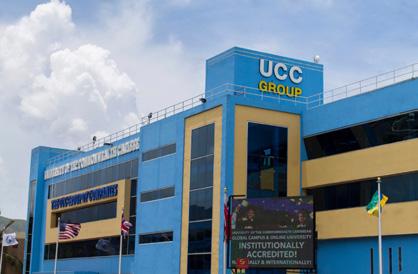

Igniting the World through Innovation, Entrepreneurship, and Student Empowerment
MENTOR’S MANTRA
SUCCESSFUL INSTITUTIONAL CHANGE RESTS ON A CLEAR, COMPELLING NARRATIVE


7 Higher Education Digest July 2023
38
24
Professor Susan Lea, Higher Education Consultant and Managing Director, Sagewood Consulting Ltd
MAPPING OUT THE STUDENT JOURNEY THROUGH PARTNERSHIP AND COLLABORATION IN HIGHER EDUCATION
Dr Kate Strudwick, Dean of Teaching and Learning, University of Lincoln, UK




8 Higher Education Digest July 2023
CONTENTS FEMALE STUDENTS LEADERSHIP
ACADEMIC VIEW
30
Dr. Sandra Baroudi, Assistant Professor, Zayed University
58
THE GLOBALISATION BACKLASH IN HIGHER EDUCATION: IS THE FOCUS ON INTERNATIONALISATION SHIFTING TO LOCAL ENGAGEMENT?
Hugo Buitrago Carvajal, Higher Education Specialist, Accreditation Council for Entrepreneurial and Engaged Universities (ACEEU), Germany


4 KEYS TO EFFECTIVE CONSULTING: A CONCEPTUAL FRAMEWORK FOR HELPING SCHOOLS ACHIEVE IMPACTFUL IMPROVEMENT
Dr. Roger J. Huston, Founder and Principal Consultant, Faith Works Consulting 64


9 Higher Education Digest July 2023
INDUSTRY PERSPECTIVE
52
AT WESTERN UNIVERSITY BRESCIA

COVER COVER Education
EMPOWERING WOMEN TO THE CHANGE THE WORLD

STORY
STORY July 2023
Established in 1919 by the Ursuline Sisters, Brescia University emerged as a beacon of empowerment, driven by their tireless dedication to social justice, community service, and the boundless potential of women. The inaugural graduating class of Brescia comprised a mere seven students who eagerly embraced the institution’s values-based education, spanning various enriching Liberal Arts disciplines. “While Brescia has flourished over the years, boasting
a thriving student population of 1,500, our unwavering commitment to nurturing women’s personal and professional growth remains resolute. Through an array of paid leadership opportunities, groundbreaking research endeavours, transformative internships, and a holistic approach to academics and wellness, we wholeheartedly celebrate the uniqueness of every woman. Our university provides unwavering support to help them reach their full potential,” says Dr. Lauretta Frederking, President of Brescia University.

Education
Aligned with its esteemed affiliation with Western University, a prestigious U15 institution, Brescia University offers students the invaluable advantage of graduating with a globallyrecognized Western degree. At Brescia, Canada’s only all-women’s university, students thrive in the intimate and supportive environment of its all-women campus while enjoying direct access to the vibrant co-ed atmosphere at Western. Situated just a brief five-minute stroll from the heart of Western, students can immerse
themselves in a wealth of experiences, with over 200 clubs, international events, varsity athletics and courses tailored to their bright futures.
A Vibrant Campus to Explore and Embrace

The Brescia campus, nestled amidst natural splendour, seamlessly blends serene surroundings with upscale amenities, elevating the university experience for its students. Each Brescia student has a single room featuring a queen-sized bed
The Brescia campus, nestled amidst natural splendour, seamlessly blends serene surroundings with upscale amenities, elevating the university experience for its students.
13 Higher Education Digest July 2023
ABOUT
AfterthreeyearsasBrescia’sAcademicDean,Dr.FrederkingwasnamedthenewPresident of Canada’s forerunner in women’s post-secondary #education. Dr. Frederking’s appointment speaks to her strengths as an academic with a lengthy curriculum vitae, a strong leader and social justice advocate. The significance of Dr. Frederking’s accomplishment is underlined by the fact only 20% of university presidents are women, and nearly 90% of Canadian public institutions are run by men. Dr. Frederking has recently been celebrated as the 2023 YMCA Women of Excellence Honoree in Arts, Culture, Education & Training.
Dr. Frederking’s achievements are made even more exceptional by the evolving history of women’s universities. Educational environments designed to uplift women are integral to buildingaworldthatissaferandmoreequitable.Researchshowswomen’suniversityalumnae are better prepared for their careers, more likely to attend graduate school, more involved in extracurricular activities, and reportedly more self-confident than their co-ed counterparts.

14 Higher Education Digest July 2023
Dr. Lauretta Frederking President, Brescia University
(60” X 80”), floor-to-ceiling windows that flood the space with natural light, spacious closets, and a personal desk/workspace offering an inspiring view of the lush campus. Furthermore, Brescia’s world-renowned School of Foods & Nutritional Sciences ensures students can anticipate exquisite dining experiences that are health-conscious and evoke a sense of comfort and familiarity reminiscent of home.
At Brescia, the institution understands that an exceptional university experience encompasses not only academic pursuits but also its students’ overall well-being and enrichment. Through its unparalleled offerings, Brescia strives to provide an environment that nurtures personal

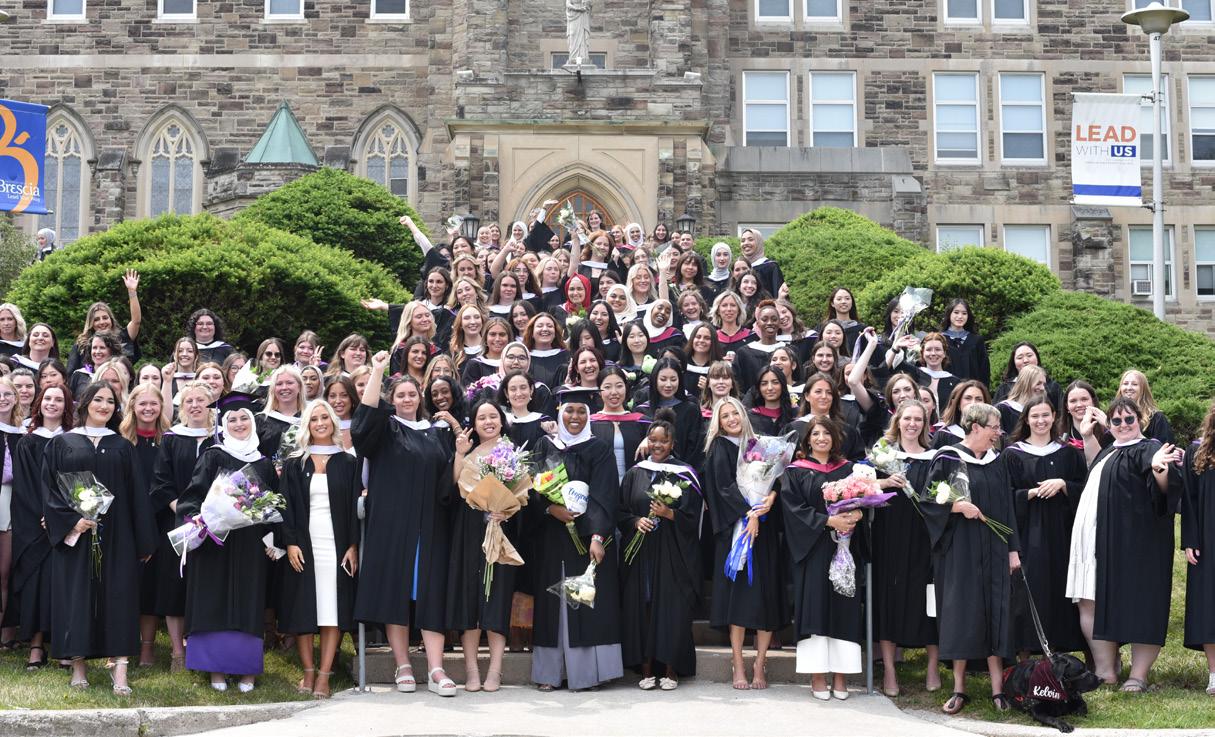
15 Higher Education Digest July 2023
growth, fosters academic excellence, and creates unforgettable memories that will shape the trajectory of its students’ lives.
Making World-Class Women Leaders
Brescia University takes immense pride in its alumnae who emerge as influential leaders across various sectors. “Not only are our alumnae gainfully employed, but they leverage their Brescia competencies to give back and make the world a safer, more equitable and vibrant place,”
To support the ongoing success of its students, Brescia provides a Professional Mentorship Program that connects them with accomplished alumnae.

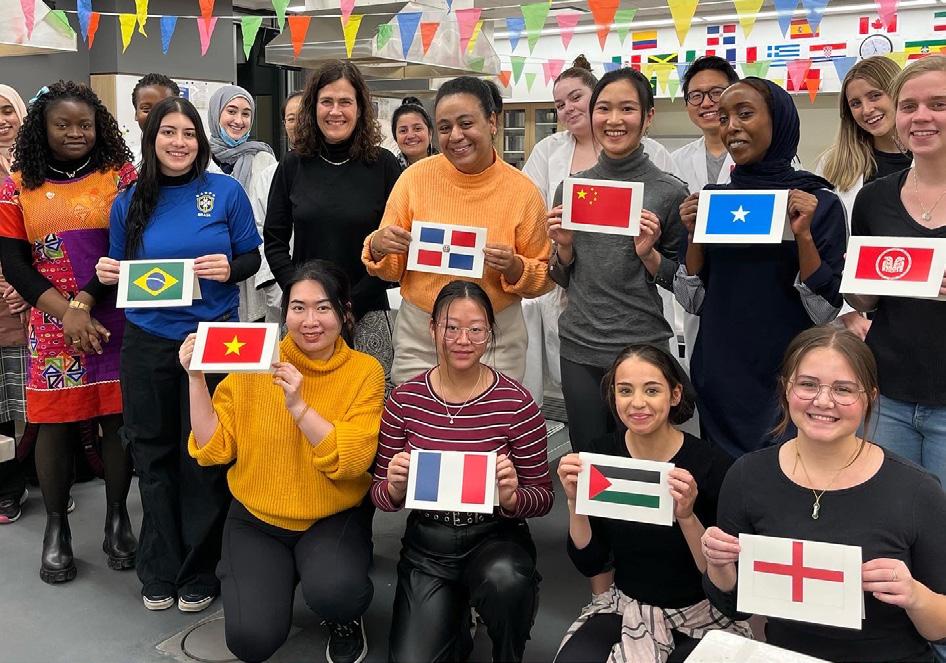
16
pinpoints Dr. Frederking. From international award winners to CEOs, founders, and elite business professionals, the bold women of Brescia excel in the “Big Four” firms, esteemed graduate schools, courtrooms, boardrooms, and operating rooms worldwide.
To support the ongoing success of its students, Brescia provides a Professional Mentorship Program that connects them with accomplished alumnae. Additionally, throughout the year, the university organizes events where Brescia leaders from renowned organizations such as PwC, Deloitte, EY, top law firms, Microsoft, and the United Nations engage with current students. These events are invaluable platforms for sharing
their personal journeys, establishing pivotal connections, and inspiring students to thrive at Brescia and beyond.

The commitment of Brescia’s alumnae to mentorship and engagement reflects the university’s core values of fostering personal and professional growth. By bridging the gap between academia and real-world experiences, Brescia ensures its students are well-equipped to make a meaningful impact in their respective fields and continue the legacy of leadership established by their distinguished predecessors.
“Our graduates consistently share that Brescia was the perfect place to develop the confidence to exceed their professional goals, as leadership
17 Higher Education Digest July 2023
opportunities are readily available. At larger universities, you may need to compete against thousands of students for a spot-on Students’ Council for financial support or hands-on research activities. But, at Brescia, our campus size means life-changing opportunities are readily available to those who seek them,” explains Dr. Frederking. Ultimately, Brescia’s commitment to providing a vibrant and empowering educational experience, coupled with its intimate campus size, sets the stage for students to embrace life-changing opportunities that will shape their personal and professional trajectories.
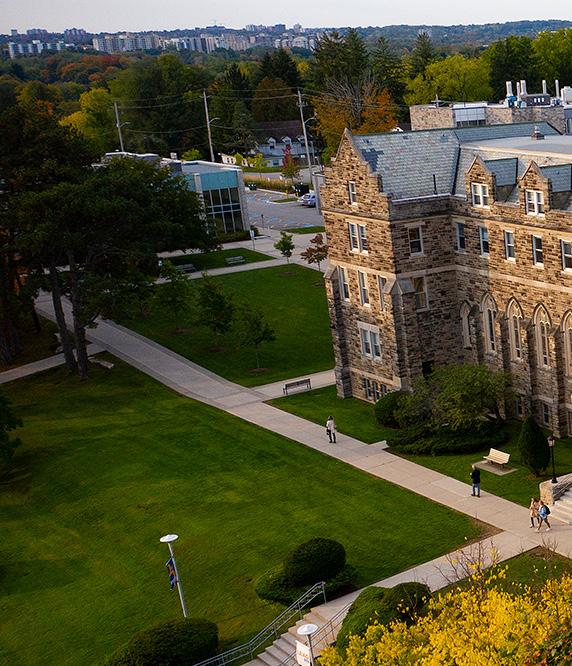

18 Higher Education Digest July 2023
Brescia University provides an environment where students from around the world can fully dedicate themselves to their studies, career development, and extracurricular activities. With an average class size of 25, students enjoy direct contact with their professors and the opportunity to build long-term relationships with them. This average class size is a tremendous and unique benefit of the campus, as many North
American universities have first-year classes with more than 250 students in them. Within these overcrowded lecture halls, it’s easy to get lost and difficult to participate. Brescia’s participation and relationship-based approach ensures students receive highly personalized reference letters from educators who are genuinely invested in their success. This is one of the many reasons Brescia students are remarkably successful at applying to
Brescia University offers its students a unique advantage by providing courses across all four campuses of Western University, opening up a world of possibilities for program combinations.

19 Higher Education Digest July 2023
and succeeding within top graduate schools. Moreover, professors at Brescia actively involve students in collaborative research, academic publications, conference presentations, and other enriching opportunities, further enhancing their resumes and academic experiences.

Brescia University’s esteemed professors have made significant contributions to various research areas. Their recent publications have covered crucial topics such as the impact of vaping, strategies for enhancing women’s safety in urban environments, and the intricate relationship between affordable housing, food scarcity, and sustainability. “An ongoing area of research focus at Brescia is women’s leadership and empowerment. So, our students are exposed to the best and most effective approaches to addressing systemic inequity and preparing women to succeed within all environments,” says Dr. Frederking.

20 Higher Education Digest July 2023
Tailoring Academic Programs to Suit Personal Interests
Brescia University offers its students a unique advantage by providing courses across all four campuses of Western University, opening up a world of possibilities for program combinations. This flexibility allows students to explore a limitless range of academic pathways. Brescia’s diverse international student community, accounting for approximately 15 percent of the student population, demonstrates a strong interest in programs such as Health Sciences, Management and Organizational Studies, Psychology, and Family Studies & Human Development.
One exceptional feature of Brescia is its distinction as one of only three universities in Canada authorized to grant Registered Dietetics degrees. Brescia Dieticians graduate equipped with the knowledge and expertise to excel in their field, often attaining prominent positions within hospitals, leading food companies, or establishing successful entrepreneurial ventures. Their contributions reach the highest levels of the profession, significantly impacting health and nutrition practices worldwide.

In the past year, Brescia University has significantly strengthened its global outreach by establishing connections in various regions, including India, the Middle East, and the Caribbean.
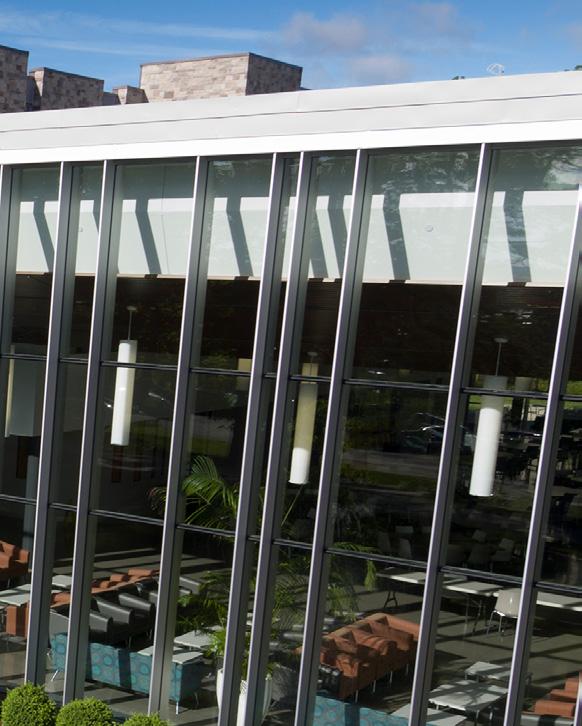
21 Higher Education Digest July 2023
London, Canada is a United Nations Designated Safe Community & Unesco City of Music

Population: 520,000
Student population: 45,000
International population: 22%
“We have also seen an exceptional uptake of international students with our Management and Organizational Studies Diploma. This postgraduate degree program allows students to build upon the skills and expertise needed to succeed within diverse corporate environments,” shares Dr. Frederking. By offering diverse programs and academic opportunities, Brescia University remains committed to providing its students with a comprehensive and internationally recognized education.
Brescia University prioritizes the employability and financial flexibility of international students. From the moment students choose Brescia, they receive support for paid experiential learning, enhancing their
portfolios and preparing them for success in the Canadian job market. Collaborating with career readiness agency Devant and the Global Education Program Coordinator, Brescia assists students in navigating the visa process and accessing the CAD 2.4 million annual scholarships. This comprehensive support ensures international students are well-equipped to excel academically and professionally at Brescia and once they graduate.
Opportunities Beyond the Academics
The opportunities for student-athletes at Brescia University are remarkable. All Brescia students have the eligibility to become part of the esteemed Western Mustangs, participating in
22 Higher Education Digest July 2023
various varsity teams. Whether it be tennis, rowing, soccer, fencing, swimming, or any other sport, Brescia students proudly represent the university across all Western teams. In the latest academic year alone, Brescia students achieved great prestige, garnering over 50 student-athlete awards in recognition of their outstanding athletic prowess and academic accomplishments.
Brescia University attracts elite athletes who seek the perfect blend of academic excellence and athletic achievement. With its luxury residence, nutritional food and accommodating professors, Brescia creates spaces that support studentathletes to reach their fullest potential, fostering a balance of physical fitness, discipline, and academic success required to compete at the
highest level in university sports. With access to top-notch facilities and resources, Brescia provides student-athletes with the tools they need to excel in their chosen sports while maintaining a commitment to their studies.

Expanding the Horizon
In the past year, Brescia University has significantly strengthened its global outreach by establishing connections in various regions, including India, the Middle East, and the Caribbean. “We work with high schools, universities, foundations and highpowered individuals to connect with potential students seeking a prestigious yet personalized education,” states Dr. Frederking.
Brescia University provides comprehensive support to international students, including International Bridging Week, where students engage with the wider Western community, explore Ontario’s top destinations, and prepare for university life. Throughout the year, Brescia organizes a range of events that celebrate cultural differences and foster a vibrant community. These events include the International Cooking Showdown, Global Fashion Show, and engaging speakers representing different nationalities. By embracing and showcasing the richness of diverse lived experiences, Brescia continually cultivates an inclusive and celebratory atmosphere.
Through these initiatives, Brescia University endeavours to create a global network of students, enhance cultural exchange, and provide international students with a welcoming and enriching educational experience.
“If your daughter is looking for the most prestigious yet personalized university to study at in Canada, learn more about Brescia at Western University.”
23 Higher Education Digest July 2023
Successful Institutional Change Rests on a Clear, Compelling Narrative
Professor Susan Lea, Higher Education Consultant and Managing Director, Sagewood Consulting Ltd
Professor Susan Lea has worked in higher education for over 30 years. A psychologist by training, after an early career at the University of Cape Town in South Africa, she held a variety of roles in a diversity of UK universities, including those in the Russell Group and those established ‘post 92’. Most recently, she was Vice Chancellor/CEO of theUniversityofHullwheresheledasignificantsuccessful transformation of the university’s financial sustainability and academic performance. Susan’s leadership is infused with a strong commitment to matters of social justice, drawing on her academic research including in areas of sexual violence and racism. Susan is now Managing Director of Sagewood Consulting Ltd and works to support institutions, their leadership, and governing body, in delivering strategic ambitions through inclusive change processes that realise intended benefits. She also coaches and mentors senior executives to contribute to leadership development programs and lectures on a successful turnaround. She serves on a number of Boards andremainspassionateabouttheroleofhighereducation in securing a more equitable and just society.

Education
MENTOR’S MANTRA
Not enough attention is paid to the narrative. Yet, it is vital to leading successful change in any context, including Higher Education. A clearly articulated, honest, and compelling narrative explains why change is necessary, how it will be led and operationalised, what the outcomes and benefits will be, and the difficulties as well as the opportunities that will form part of the process.
Those leading changes need to be able to describe succinctly the unique story of their organisation for a diverse range of people with different stakes and interests. It is perhaps surprising, therefore, how often leaders are not able to be explicit about their vision, strategy, and plans for delivering change. This can see members of leadership teams working to slightly different or even contrary agendas, staff feeling unclear as to leadership’s ambitions and the role they are expected to
play in achieving these, and partners being uncertain as to the implications of change programs for them and those they serve.
Of course, the majority of leaders have definite ambitions for the institutions they lead and know how they intend to realise them. Consequently, the lack of clarity resides not in the leader’s head but in their effective communication of those goals via a well-honed narrative. Moreover, university leaders often report that the pressures associated with the execution of their duties and responsibilities mean taking the time to engage formally and informally with staff, students, partners, and members of external communities drops off the agenda or is delegated to others.
I would argue, however, that being explicit about intentions, outcomes, and how these will be realised is essential to securing successful, sustainable change for a number of reasons. First, a clear narrative provides the
25 Higher Education Digest July 2023
The majority of leaders have definite ambitions for the institutions they lead and know how they intend to realise them
foundation for the formulation of strategy and associated operational plans. It tells the story of the institution’s journey - its recent history, current situation, and intended future – in language that is accessible and compelling. As such, it provides the framework within
which people will understand progress, evaluate outcomes and celebrate success.
Second, precisely because the narrative should provide an honest, transparent, and straightforward account, it forms the bedrock of engaging staff, students, partners, and supporters in the change

26 Higher Education Digest July 2023
process. It is the basis of an ‘a call to action’. Taking people with you through meaningful engagement and collective action is a sine qua non of leadership. Facilitating dialogue around the narrative and encouraging participation in delivering a vision for the future fosters a
sense of collective identity and purpose. At the same time, integrity as to the challenges that lie ahead and the difficult decisions that will likely need to be taken is critical.

Third, successful change depends on leaders and managers throughout the organisation being visibly aligned. In the absence of a narrative, leaders or managers may need to develop their own account of what is happening in their institution and why. This can be challenging for those individuals, who may feel variably confident in their own understanding of what is happening and may face robust questioning and confrontation from staff, students, or trade unions. In essence, then, a well-articulated narrative supports a variety of leaders and managers – often those in the mid-layers of the organisation - to understand their role in bringing about change and in guiding those for whom they are responsible. In turn, they can provide valuable feedback to senior executives as well as offer insights and observations that might otherwise be invisible to those in the highest echelons. Significantly, in the absence of a compelling narrative, differing versions of events will inevitably circulate within any organisation including unhelpful and erroneous myths. These can precipitate a sense of confusion, anxiety, and mistrust, which will mitigate against engagement and adversely impact delivery.
A helpful tool for developing an institution’s narrative is what I would term ‘a case for change’. This represents a pithy, formal document that presents evidencebased arguments for what needs to change and why, and then with brevity sets out
27 Higher Education Digest July 2023
Facilitating dialogue around the narrative and encouraging participation in delivering a vision for the future fosters a sense of collective identity and purpose
aims, objectives, plans, and intended outcomes and benefits. Although a case for change requires careful thought, this investment pays substantial dividends later. Not least, the very discipline of writing such a document tests the veracity of one’s arguments; the strength of the rationale; the clarity of prioritisation; the degree to which the change program is cohesive, purposeful, and robust; and, ultimately, the organisation’s capacity, resilience and determination to see it through. Testing the ‘case’ within the executive team and Governing Body helps to refine and strengthen it, thereby building collective confidence and buy-in at senior levels. Articulating the ‘case’ to staff, student leaders, and external stakeholders in forums that encourage dialogue and thoughtful exchange allows for further checks and balances and often surfaces valuable ideas that may make a material contribution to the change agenda.
The development of a ‘case for change’ is just the first step on what is usually a reasonably lengthy journey. However, without this clarity shared by the institution’s leadership and understood by those within the university community, a program of transformation is
already compromised. According to research by McKinsey (Arononowitz, De Smeth, and McGinty, 2015), fewer than a quarter of organisational redesign efforts succeed: 44 percent ‘run out of steam after getting under way’, and a third fail to meet their objectives or improve performance. From my perspective, one key factor in this lack of success is the absence of a clear and compelling narrative. Language is the medium through which we communicate with one another. Yet I would argue that we pay insufficient attention to the power of language in delivering change. Without generating a widespread and clear understanding of the need for change, how it will be delivered, and what sustained benefits it will bring to individuals, the organisation, and the wider community, results will be compromised or never realised. In a world beset with significant and existential challenges, we need resilient, purposeful universities and higher education institutions which create inclusive, dynamic environments in which their staff and students can thrive. Narrating our mission, purpose, value, and plans is our responsibility as leaders, one we should take seriously as we seek to serve our institutions and wider communities.
28 Higher Education Digest July 2023
Without generating a widespread and clear understanding of the need for change, how it will be delivered, and what sustained benefits it will bring to individuals, the organisation, and the wider community, results will be compromised or never realised
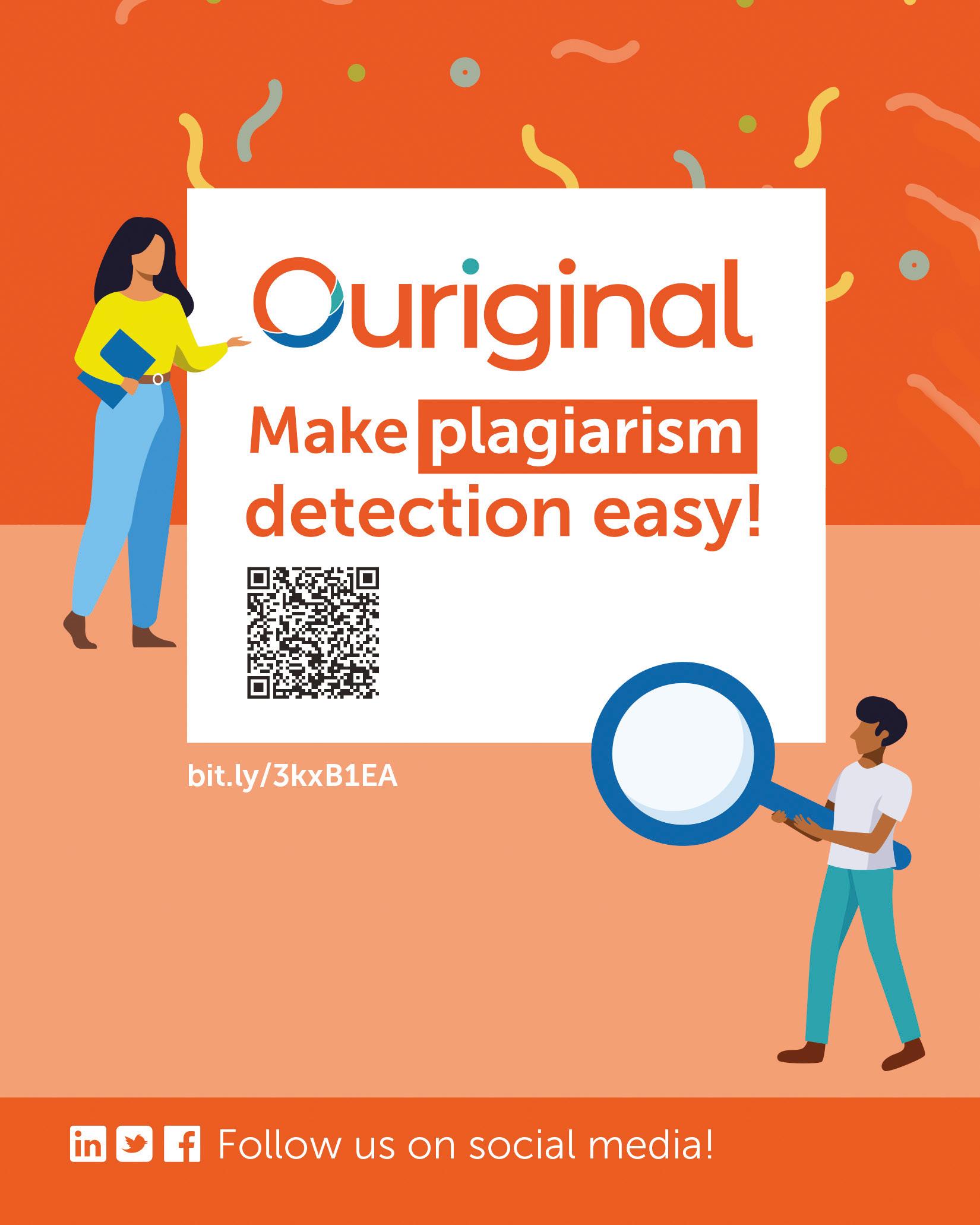
Higher Education Digest July 2023 Higher Education Digest October 2021
Female Students Leadership
Dr. Sandra Baroudi, Assistant Professor, Zayed University
Dr.SandraBaroudiisanexpertinleadershipandmanagementinEducation,aninternationaljournals reviewer, lecturer, trainer, and research consultant, with extensive experience in academia in the United Arab Emirates. Dr. Baroudi holds a Ph.D. in Leadership, Management, and Policy in Education from the BritishUniversityinDubai,UAE.SheisanAssistantProfessorattheCollegeofInterdisciplinaryStudiesZayed University, Dubai, UAE. She is the co-founder of Eduvate, an online professional development platform for teachers and educational leaders. Dr. Baroudi is a highly skilled trainer and curriculum designer in the field of leadership and policies and teaching and learning. She is a certified associate for the Blackboard Academy and a Fellow for Advanced Higher Education. She was a fellow for the Education Endowment Foundation in the UK and Queen Rania Foundation in Jordan where she led the contextualization of the Teaching and Learning Toolkit into the Arab world context. In her work, Dr. Baroudiseekstoprovideevidence-baseddataandbestpracticesforleadersandeducatorsintheArab world with the aim of supporting their decisions to promote innovative and quality education.
This article sheds the light on female leadership topics in the Arab world context and particularly among higher education students. Literature to date has shown the relationship between
female students’ leadership skills and their self-growth, well-being, and self-awareness. More importantly, this relationship positively impacted their academic performance and nurtured in them their career-related skills.
Higher Education Digest July 2023
ACADEMIC VIEW
Anecdotal evidence also showed that females are able to better balance between jobs and families in order to become more independent and contribute to the economy of the country

31 Higher Education Digest July 2023
These skills include and are not limited to goal setting, time management, decision-making, flexibility, and adaptability. These are the sustainable skills that every leader looks for when recruiting new employees to his/her company as they are proven to be positively correlated with employees’ job performance and effectiveness. Hence, if these skills are not nurtured or promoted in students, these latter will eventually fail in their future professions. Even at the personal level, these skills are at the core of their success as students who have these skills are more independent and have greater self-control than others.
Many policies were developed in many Arab countries towards the development of female leadership in order to encourage females to take on leadership roles and promote gender equality. However, in many Arab contexts, the market still falls short of proving or demonstrating gender equality especially when it comes to providing females with equal income to their male counterparts who are occupying the same job. Not only that but Arab females are not motivated in joining the job market as the Arab culture and beliefs shape their mindsets into the nurturing role of women and their role to up bring their children and fulfill their role as a wife and a mother at the expense of others. Luckily and for the past decade, studies have revealed that there has been a marginal increase in women’s employment rates and that females have slowly started advancement into fulfilling senior positions. Anecdotal evidence also showed that females are able to better balance between jobs and families in order to become more independent and contribute to the economy of the country.
32 Higher Education Digest July 2023
Creating debate programs within and across universities is vital as they enhance students’ communication and negotiation skills, boost their confidence, and increase their general knowledge
To that extent, findings of empirical studies proposed for higher education institutions to develop peer mentoring programs where female students have the opportunities to mentor other students and practice similar like career skills. Peer mentoring programs are widely spread in higher education, but little attention is given to their impact on mentors’ and mentees’ personal and psychosocial development. Furthermore, involving female students in leadership activities inside and outside the university and encouraging them to join clubs and organizations can help them gain practical experience in managing and leading a group. Additionally, through the partnership network that higher education institutions have, female students can work hand in hand with local companies and participate in solving real problems that these companies are facing. Providing female students with such opportunities will develop their problemsolving skills, innovation, and creativity skills, and teamwork skills and widen their professional network. On this note also, providing female students with guest speaker events, public speaking opportunities, participation in conferences locally and internationally, and alumni networking events will all help them build their professional network and connect with other female leaders who can inspire them. Creating debate programs within and across universities is vital as they enhance students’ communication and negotiation skills, boost their confidence, and increase their general knowledge. Furthermore, higher education institutions can plan for guest lecturing events or sessions to showcase successful female leaders as role models for students. This is also important as students will learn about challenges that they might face during their
careers and how this leader overcame them. Also, offering training workshops that focus on building female students’ self-awareness, self-regulation, self-efficacy, self-confidence, and assertiveness is believed to be effective. In these workshops, female students will have the chance to assess their own leadership practices, reflect on their strengths and weaknesses, and learn how to improve these by working on hands-on activities to create goals, develop their leadership vision and strategy, and build effective leadership styles. Last but not least, encouraging females to enter the Science, Technology, Engineering, and Mathematics (STEM) fields will increase their representation in those fields as they are currently dominated by males, and it will also help develop technical leadership skills and strategies for overcoming gender biases in STEM settings.
If higher education institutions were to contribute to building a sustainable future, it is then imperative to achieve gender equality as one of the sustainable development goals (SDG #5). Empowering females and offering them opportunities to practice leadership skills in various contexts, inside and outside the classroom, would motivate them to join leadership roles and participate in the decision-making process. Reducing the gap of equality between the two genders is important for promoting diversity and inclusion, social justice, economic growth, and better health and well-being. Gender equality and female empowerment will lead to a developed human capital where both genders have access to quality education that can result in a more educated, skilled, and capable workforce, which is essential for the overall development and progress of societies.
33 Higher Education Digest July 2023
Acadia University
Acadia University is a Canadian undergraduate university known for its small class sizes and personalized learning environment, situated in the picturesque town of Wolfville.

Website:
https://www2.acadiau.ca/
Location: Wolfville, Nova Scotia, Canada
Admission Portal Link:
https://www2.acadiau.ca/apply.html
Amherst College
Amherst College is a highly selective liberal arts college renowned for its rigorous academic program and diverse community.
Website:
https://www.amherst.edu/
Location: Amherst, Massachusetts, USA
Admission Portal Link:
https://www.amherst.edu/admission

34 Higher Education Digest July 2023
Brescia University College
Brescia University College is Canada’s only women’s university offering a wide range of programs within a welcoming and supportive campus atmosphere.

Website:
https://brescia.uwo.ca/
Location: London, Ontario, Canada
Admission Portal Link:
https://brescia.uwo.ca/admissions/
Colorado College
Colorado College is a private liberal arts college with a unique block plan, emphasizing immersive learning experiences and close faculty-student interaction.
Website:
https://www.coloradocollege.edu/

Location: Colorado Springs, Colorado, USA
Admission Portal Link:
https://www.coloradocollege.edu/admission/
Middlebury College Trent University
Middlebury College is a prestigious liberal arts college with a strong focus on languages, environmental studies, and global engagement.
Website:
https://www.middlebury.edu/
Location: Middlebury, Vermont, USA
Admission Portal Link:
https://www.middlebury.edu/college/admissions

Trent University offers a wide range of programs, emphasizing interactive learning and critical thinking, set on a natural and vibrant campus.

Website:
https://www.trentu.ca/
Location: Peterborough, Ontario, Canada
Admission Portal Link:
https://www.trentu.ca/futurestudents/apply-now
35 Higher Education Digest July 2023
University of Guelph
The University of Guelph is a comprehensive research institution with a strong emphasis on agriculture, veterinary medicine, and environmental sciences.

Website:
https://www.uoguelph.ca/
Location: Guelph, Ontario, Canada
Admission Portal Link:
https://admission.uoguelph.ca/
University of Northern British Columbia (UNBC)

UNBC is a research-intensive university that focuses on the environment, natural resources, and Indigenous studies, located amidst British Columbia’s beautiful landscapes.
Website:
https://www2.unbc.ca/
Location: Prince George, British Columbia, Canada
Admission Portal Link:
https://www2.unbc.ca/admissions
University of the Commonwealth Caribbean (UCC)

UCC is the largest private higher education institution in the Caribbean, providing a wide range of academic programs to students from various countries.
Website:
https://www.ucc.edu.jm/
Location: Kingston, Jamaica
Admission Portal Link:
https://www.ucc.edu.jm/prospective-students
Williams College
Williams College is a top-ranked liberal arts college known for its strong academic tradition, accomplished faculty, and vibrant campus life.
Website:
https://www.williams.edu/
Location: Williamstown, Massachusetts, USA
Admission Portal Link:
https://www.williams.edu/admission-aid/

36 Higher Education Digest July 2023
Lead your institution through the new normal and beyond
Today’s learners and faculty have high expectations, requiring an integrated and exible learning experience that operates seamlessly and intuitively. By partnering with Blackboard, you can enhance your institution’s brand by providing students and faculty with a holistic and integrated modern learning ecosystem.
Blackboard brings together the technologies and services you need to lead your institution through this digital transformation.
GLOBALBESTPRACTICES
LEARNINGAPPROACH RESULT INTEGRATED
EFFECTIVETEACHING
MEASUREMENT TECHNOLOGIES
To learn more, visit blackboard.com

37 Higher Education Digest July 2023
&
UNIVERSITY OF THE COMMONWEALTH CARIBBEAN (UCC)

Igniting the World through Innovation, Entrepreneurship, and Student Empowerment
The University of the Commonwealth Caribbean (UCC) is more than just a higher education institution; it is a melting pot of cultures, a hub of innovation, and a gateway to a brighter future for students from around the world. With a rich history dating back to the 1970s, UCC has evolved into a dynamic, modern, and globally recognised institution that offers a diverse range of programmes and opportunities to help students achieve their academic and personal goals. “The University of the Commonwealth Caribbean was established in 2004 with the merger of the Institute of Management Sciences, founded and incorporated in 1992 by Group Chairman Dr. Winston Adams and Deputy Group
38 Higher Education Digest July 2023
The University of the Commonwealth Caribbean was established in 2004 with the merger of the Institute of Management Sciences, founded and incorporated in 1992 by Group Chairman Dr. Winston Adams and Deputy Group Chair Mrs. Geraldine Adams, and the Institute of Management and Production, which was incorporated in 1976

Higher Education Digest July 2023
A native of the Virgin Islands, Professor Haldane Davies is an accomplished and dynamic university administrator with extensive knowledge of administrative principles and procedures and in-depth understanding of university structuring and operations to propel organizational growth and achieve favourable results.
An academician with a deep commitment to quality and quality assurance, Professor Davies has served for many years as an accreditation and award evaluator for Middle States Commission on Higher Education (MSCHE), National Certified Public Manager Consortium (NCPMC), and Malcolm Baldrige Performance Award Programme.
The former Vice President for Business Development at the University of the Virgin Islands (UVI), he was instrumental in securing major multi-milliondollar grants and contracts, helping to initiate numerous high-priority projects and enhancing the UVI’s presence in the Caribbean region and beyond through various partnership agreements.

40 Higher Education Digest July 2023
PRESIDENT
Professor Haldane Davies
Chair Mrs. Geraldine Adams, and the Institute of Management and Production, which was incorporated in 1976,” shares Professor Haldane Davies, President of University of the Commonwealth Caribbean.
Being the largest and fastest-growing private institution of higher education in Jamaica is no

small feat, but UCC has managed to achieve this through its commitment to excellence, innovation, and inclusivity. With a diverse range of programmes, flexible delivery modes, and access to financing, UCC has made higher education more accessible to students from all walks of life, regardless of their financial
UCC’s institutional accreditation from the University Council of Jamaica and the UK-based Accreditation Service for Independent Colleges and Universities attests to the quality and rigour of its academic programs, ensuring that students receive a world-class education that is recognised both locally and internationally
41 Higher Education Digest July 2023
circumstances or geographical location. Moreover, UCC’s institutional accreditation from the University Council of Jamaica and the UK-based Accreditation Service for Independent Colleges and Universities attests to the quality and rigour of its academic programmes, ensuring that students receive a world-class education that is recognised both locally and internationally.

UCC’s commitment to quality doesn’t stop there. As a registered member of the Jamaica
Tertiary Education Commission, UCC is subject to rigorous regulatory and supervisory standards, which means that students can be assured of the highest standards of academic integrity and quality assurance. Prof. Davies says, “Our vision is to provide broad-based educational opportunities through partnerships, flexible delivery modes and access to finance in an environment where high standards, truth, respect and the dignity of the person
Education
are embraced.” In short, UCC is a symbol of Jamaica’s commitment to excellence in education and a beacon of hope for students from all corners of the globe who are looking to achieve their academic and personal goals.
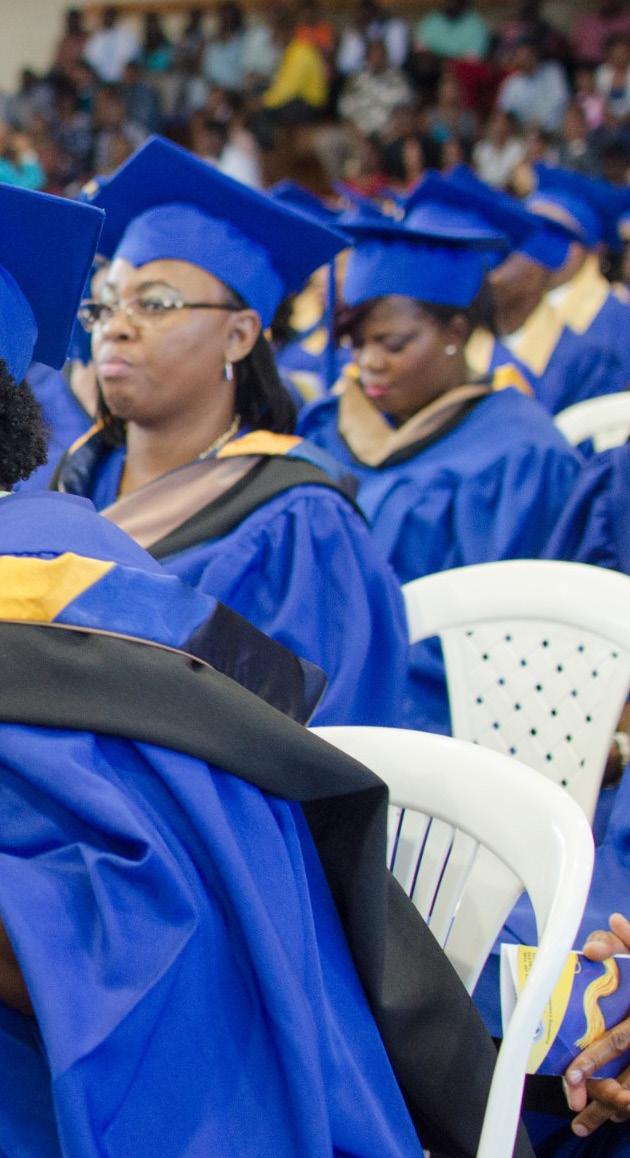
Offering a Multitude of Opportunities
At UCC, students have the opportunity to pursue a wide range of disciplines, from professional certificate programmes all the way up to doctoral
degrees. Whether you’re looking to jumpstart your career with a certificate or diploma or take your education to the highest level with a doctoral degree, UCC has the programmes and support to help you achieve your goals. “Throughout its history, we have been characterised by dynamic entrepreneurialism and international institution partnerships,” states Prof. Davies.
UCC is the only local Institution to be recognised as an affiliate University of London institution, which means that it is authorised to provide support to Jamaican students enrolled in the Certificate of Higher Education in Common Law and the Bachelor of Laws degree programme. This partnership with the University of London is just one of many examples of UCC’s commitment to offering world-class educational opportunities to its students. “We have also partnered with Florida International
43 Higher Education Digest July 2023
With its commitment to flexibility and innovation, UCC is making higher education accessible to a broader range of students, including those who may not have been able to pursue a university degree in the past
University to offer the Professional Master of Business Administration and the Master of Science in Engineering Management. These programmes provide students with the skills and knowledge they need to succeed in today’s rapidly evolving business and engineering landscapes,” pinpoints Prof. Davies.

In addition, UCC has licensed the Commonwealth Executive Master of Business Administration and the Commonwealth Executive Master of Public Administration
degree programs from the Commonwealth of Learning, further expanding its range of academic offerings. For those looking to take their education to the highest level, UCC offers a Doctorate in Business Administration as well as a Professional Doctorate in partnership with the UK-based University of Sunderland as the awarding body. These partnerships and collaborations are just some of the many ways that UCC is working to provide students with the highest-quality education possible.
44 Higher Education Digest July 2023
UCC Global’s mission is to make quality higher education available to qualified students anywhere they are, with highly skilled and certified international teachers from a variety of backgrounds, delivering excellent programs entirely online
Going Global with UCC Global
With its commitment to flexibility and innovation, UCC is making higher education accessible to a broader range of students, including those who may not have been able to pursue a university degree in the past. Whether through its UCC Online or UCC Global programmes, the Institution is delivering quality education that meets the needs of students from all over the world. UCC currently hosts approximately 20 international students from across the Caribbean, South America and Africa in its online learning environment.
In addition to its online offerings, UCC also provides hybrid learning options, which blend both online and in-person learning experiences. This allows students to take advantage of the convenience of online learning while still benefiting from the personal interaction and support of a traditional classroom setting. “UCC Global, our world-class online education division, offers an extensive range of study options with the full flexibility to pick and choose a programme plan or specific subject area that suits a prospect’s career aspiration,” says Prof. Davies.
UCC Global’s mission is to make quality higher education available to qualified students anywhere they are, with highly skilled and certified international teachers from a variety of backgrounds, delivering excellent programmes entirely online. Prof. Davies adds, “UCC Global recognises that today’s students require the freedom to integrate education with everything else in their lives at their own pace, and so our online classroom is available 24 hours a day, seven days a week.”
UCC’s commitment to staying ahead of the curve is reflected in its diverse range of programmes, including those in emerging fields. The Institution’s focus on cutting-edge fields like data privacy, artificial intelligence, and computer engineering ensures that students are equipped with the knowledge and skills necessary to thrive in today’s ever-changing job market. With many new programmes coming on stream every year, UCC is constantly expanding its offerings to meet the needs of the future workforce.
Moreover, UCC’s accreditation by the Accreditation Service for International Schools, Colleges, and Universities (ASIC) and Premier
45 Higher Education Digest July 2023
status with ASIC for its commendable areas of operation is a testament to the quality of education offered at the Institution. Students and parents alike can rest assured that UCC meets high international standards, making it an excellent choice for those seeking a quality education.
Prof. Davies assures, “Our online programmes, which are 100% accredited, are offered asynchronously, providing international students with the flexibility to study at their own pace in their own time. This ensures that students can balance their studies with their personal and
professional responsibilities, making it an ideal option for working professionals or those with family obligations.” The Bachelor of Science degrees in Business Administration, Marketing, and Human Resource Management are popular programmes for UCC’s international students.

An Inclusive Learning Experience
UCC Global offers a variety of accredited undergraduate and graduate programmes that can be completed 100% online, providing international students with the flexibility to study at their own pace and in their own time. Some of
46 Higher Education Digest July 2023
UCC is committed to promoting entrepreneurship among its students and the wider community through its Business Development and Consulting Institute (BDCI)
the undergraduate programmes available include BSc Business Administration, BSc Business Administration in Accounting, BSc Business Administration in Financial Management, BSc Marketing, and BSc Information Technology. UCC Global also offers graduate programmes (MBAs) in Accounting, Entrepreneurship, Finance, Healthcare Management, Human Resource Management, and Marketing.
To augment the academic quality, UCC is actively fostering research on its campus through various measures. Prof. Davies explains, “Lecturers who are active researchers are given a reduced teaching load, allowing them to dedicate more time to their research. Financial assistance is also provided to lecturers to attend conferences, pay the publication fee, and purchase research-related equipment.” At UCC, collaborative research is encouraged among lecturers, students, and overseas scholars. The Institution also organises an annual Writers’ Retreat that assists faculty members in improving their research skills and research output.
Furthermore, UCC hosts an annual Research Conference that facilitates collaboration and
networking, as well as monthly Brown Bag sessions, which promote the sharing of research ideas and showcase completed research projects. These initiatives demonstrate the Institution’s commitment to fostering a vibrant research culture on campus. “We have made it as a mission to attract the best and brightest faculty, who are not just credentialed (PhD), but who are also well sought after, respected and experienced leaders in their respective fields,” pinpoints Prof. Davies.
Having a diverse faculty body allows for a more inclusive and culturally rich learning environment, which is integral to UCC’s global vision. Faculty members from different countries and cultures bring a unique perspective to the classroom and enable the Institution to promote cross-cultural understanding among its students. In addition, UCC has established partnerships with universities and institutions across the world, which facilitates student and faculty exchange programmes. These exchange programmes allow for the sharing of knowledge, ideas, and experiences, which ultimately enhances the quality of education offered at UCC.
47 Higher Education Digest July 2023
Encouraging Innovation and Creativity
UCC actively fosters innovation and entrepreneurship among its students through various projects and programmes. One such programme is the annual Innovators Unlimited Battle Ground hackathon, which allows students to participate in local, regional and international events. UCC’s Innovation Centre also provides training in app development, business readiness and financing to expose students to issues affecting Jamaica. Students are also encouraged to participate in various competitions, including the Development Bank of Jamaica (DBJ) Business Model Competition.
“Our students need to complete a capstone project with a business case as a component. We encourage them to commercialise this research,” shares Prof. Davies. The UCC Innovation Centre supervises mandatory applied research capstone projects for the Information Technology department, where students develop platforms such as a freelance platform similar to Upwork and a B2B trade platform fine-tuned to CARICOM trade rules. Besides, innovation and entrepreneurship courses such as BUS403 or IT Entrepreneurship are also part of the IT degree or social sciences and law programmes.
The UCC Innovation Centre hires student workers to complete research and test solutions via startups or UCC services such as UCC TV or IUBG. “One student is currently completing research on ChatGPT and its potential use in automating workflows done by professional financial analysts, with the aim of helping startups complete financial records and venture capital investment proposals,” says Prof. Davies.
UCC is committed to promoting entrepreneurship among its students and the wider community through its Business Development and Consulting Institute (BDCI). The BDCI is a member of the Jamaica Small Business Development Centre (SBDC) Network and works in collaboration with the Jamaica Business Development Corporation (JBDC). “The BDCI provides free webinars to students and aspiring entrepreneurs to sensitise them about the industry and trending topics and challenges faced by entrepreneurs. Some of the topics covered include how to obtain financing,

48 Higher Education Digest July 2023
pitching, tax filing, and patent registration,” explains Prof. Davies. Additionally, workshops on starting a business are provided to individuals who are currently in the startup phase. These workshops cover various aspects of starting a business, such as ideation, record-keeping and budgeting, website design, and e-commerce.
“The BDCI has an open-door policy, and free counselling services are provided to individuals with existing businesses or those interested in starting their own business,” states Prof. Davies. UCC also collaborates with the Innovation Entrepreneurship and Technology Centre to
organise the Hackathon and Business Model Competition. Through these initiatives, UCC seeks to promote entrepreneurship, innovation and equip individuals with the necessary skills to succeed in their business ventures.
A Rewarding Academic Life
“At UCC, we believe that the student experience should be both academically and professionally fulfilling. That’s why we have a Department of Student Support, Career Development, and Alumni Services that offers a range of programmes and resources to help students

49 Higher Education Digest July 2023
To expand access to higher education, UCC is offering more undergraduate and graduate programs through its asynchronous platform, as well as providing stackable credentials and delivering some graduate programs in languages such as Spanish and Portuguese
achieve their goals,” shares Prof. Davies. One such resource is UCC’s career guidance and job placement assistance, which helps students identify and pursue career paths that match their skills and interests.
UCC also encourages students to participate in capacity-building activities such as field trips, sports days, conferences, guest lectures, and webinars featuring experts and professionals from various industries. These activities help students to develop their skills and knowledge in areas beyond their academic programmes. “We encourage students to create and join clubs and societies, as these groups provide opportunities for networking, socialising, and personal growth. For example, our UCC Debating Society has represented the institution in various competitions and events, including the Commonwealth Day Year of Youth Panel Discussions and the JADE National Collegiate Debating Championships 2023, where they placed fourth out of 20 teams,” says Prof. Davies. Overall, there is always something happening at UCC, as the Institution is committed to providing its students with many opportunities for enrichment and personal growth.
Igniting the World UCC, under the leadership of its president, Professor Haldane Davies, has embarked on a journey to IGNITE THE WORLD. The Institution is working with industry partners to ensure that graduates are workforce-ready
and capable of effectively contributing to their organisations. “We aim to assure quality and overall institutional effectiveness of student learning and institutional outcomes by teaming with partners like WorldSkills Jamaica to clearly state that all students at whatever level of learning are progressing from competence to excellence,” shares Prof. Davies.
To expand access to higher education, UCC is offering more undergraduate and graduate programmes through its asynchronous platform, as well as providing stackable credentials and delivering some graduate programmes in languages such as Spanish and Portuguese. The Institution is also collaborating with other institutions of higher education to ensure increased access to tertiary education for all people, irrespective of their socioeconomic background.
“Creating digitally competent global citizens is one of our primary goals, and to that end, we aim to ensure that each student graduating from UCC effective 2024 completes a course or obtains a micro-credential in digital literacy or other similar type certification offered at the Institution,” says Prof. Davies. As UCC continues to expand its offerings and partnerships, it remains committed to its mission of preparing students to become exceptional leaders and scholars in a caring and intellectually stimulating academic environment. With its focus on innovation, flexibility, and accessibility, UCC is truly an Institution for the modern world.
50 Higher Education Digest July 2023



51 Higher Education Digest July 2023 © 2022 Turnitin LLC. All rights reserved. www.turnitin.com Inspire student success. Deliver actionable feedback, faster with Turnitin Feedback Studio. Discover more at www.turnitin.com/products/feedback-studio
The Globalisation Backlash in Higher Education: Is the Focus on Internationalisation Shifting to Local Engagement?
Hugo Buitrago Carvajal, Higher Education Specialist, Accreditation Council for Entrepreneurial and Engaged Universities (ACEEU), Germany
Over the past four decades, a significant push for the internationalization of higher education has taken place. Several universities have dedicated efforts to establishing services to attract students, faculty, and resources from across the globe. This trend has undoubtedly resulted in numerous benefits including increased diversity, access to new knowledge, and economic resources. However, over the last decade, a counter-movement against the globalisation of higher education has emerged.
The local engagement has consolidated as a growing strategic priority, with the potential to generate multiple benefits for higher education institutions.
Internationalisation of higher education
Research on the internationalisation of higher education has yielded multifaceted perspectives that can be traced to three distinct waves. During the 80s and 90s, the main focus was devising strategies to facilitate the mobility of people and programs. The second
52 Higher Education Digest July 2023
The mobility of students remains pivotal for some institutions, serving as a critical driver of institutions’ financial sustainability through revenue generated from tuition and services
INDUSTRY PERSPECTIVE
Hugo Buitrago Carvajal serves as Higher Education Specialist at the Accreditation Council for Entrepreneurial and Engaged Universities (ACEEU) in Germany.Hehastheoverallresponsibilityof managing EU-funded projects such as QualAI-TyEngagement,BETTERLife,andWeRin, among others, with a special emphasis on topics related to quality assurance, social engagement, and higher education entrepreneurship. Additionally, he also works on grant ideation, writing, and application, as well as in the creation of internationalconsortiums. Hugoholds an MSc in Research and Innovation in Higher Education from the universities Danube Krems (Austria) and Tampere (Finland), in addition to master studies in Educational and Social Development from the National Pedagogical University (Colombia).

Education July 2023
shifted the focus to “internationalisation at home”, whereby institutions sought to internationalise their on-campus activities without necessarily promoting mobility. Recently, in the third wave, the attention turned to the local context with strategies such as “inclusive internationalisation”, “intelligent internationalisation” and “internationalisation of higher education for society”. This last wave of perspectives on internationalisation merges with existing initiatives on community and social engagement in higher education.
In the 2020 edition of the Internationalisation in Higher Education for Society (IHES) manual published by DAAD, the authors underscored the necessity of including social engagement as a means to address the imbalance generated by agendas on internationalisation. This imperative is particularly pertinent in European universities, where policies emphasise the importance of universities demonstrating social pertinence and fostering increased social cohesion. As internationalisation is recognised as an outreach strategy, it inherently encompasses social engagement, aligning with efforts to enhance the relevance and societal contributions of higher education.
The mobility of students remains pivotal for some institutions, serving as a critical driver of institutions’ financial sustainability through revenue generated from tuition and services. Beyond this economic impetus, internationalisation at home profoundly impacts the quality of curricula and learning outcomes of students. Despite the acknowledged significance of internationalisation, smaller regional institutions, which comprise the majority, may dedicate less strategic importance to it. Instead, these institutions may focus on fostering
productive alliances with local organisations to enhance the quality of their educational, research, and engagement (third mission) missions.
Social Engagement in higher education
In recent years, social and community engagement has been revitalised in Europe through policies outlined by the European Commission and projects funded by the Erasmus+ and Horizon Europe programs. Community engagement has a long-standing tradition in universities in Latin America and the USA, where it is implemented through a range of activities including service learning, community-based research, and other services. In Europe, the emphasis on engagement has been amplified as policies underscore the need to engage with diverse sectors, namely businesses, and industry, the public sector, and civil society organisations and citizens. This has resulted in a shift towards using the term “social engagement” in Europe, rather than “community engagement”
An increasing number of universities are emphasising the establishment of partnerships with local businesses, nonprofit organisations, and government agencies to address pressing social and economic issues in their respective regional ecosystems. The move towards local engagement is motivated by a confluence of factors, including dynamic political and economic landscapes, evolving student expectations, and heightened awareness of the imperative for universities to act as responsible and responsive social agents.
The changing political, economic, and social landscapes have demonstrated the necessity for higher education institutions to articulate and contribute to social, cultural, and economic progress in their regions. This
54 Higher Education Digest July 2023
Many institutions now recognise the potential of their resources and expertise to solve local problems, resulting in a renewed focus on social engagement
strategic emphasis not only generates notable benefits for the institutions, which become influential stakeholders in their ecosystems and partner with key stakeholders that help them to effectively develop their activities.

It also generates benefits for their respective regions by providing key expertise to address pressing local challenges.
Further, growing concerns regarding matters such as environmental and social issues,
55 Higher Education Digest July 2023
sustainability, and employability, among other critical topics, have driven universities to take decisive action. Universities have devoted significant attention to the development of green campuses and practices. Beyond this, there has been an intense focus on active involvement in local entrepreneurial ecosystems. Additionally, strengthening collaborations between universities and industry/businesses, as well as university-nonprofit partnerships, has emerged as a salient necessity. These priorities are now embedded in the missions of many higher education institutions.
Furthermore, governments and societies are increasingly calling upon higher education institutions to contribute to the consolidation of knowledge-based economies and cohesive societies. In Europe, these expectations have been highlighted at several points in the European Strategy for Universities, published in 2022, which emphasises the importance of universities demonstrating accountability, social responsibility, and relevance to society. As a result, there is growing awareness of universities’ responsibility to address pressing social and economic issues within their surrounding ecosystems. Many institutions now recognise the potential of their resources and expertise to solve local problems, resulting in a renewed focus on social engagement. However, this focus also presents a challenge for institutions that need to realign their functions and services to address these demands.
The challenge of strategic change
The push for contemporary global challenges is posing an urgent necessity for universities to address their relations with their surrounding ecosystems. In response, many European
universities have engaged in the development of comprehensive tools that facilitate framing, diagnosis, support, and incentivization of social engagement. Notable examples include the TEFCE Toolbox (Towards a European Framework for Community Engagement in Higher Education), which has formulated a framework for identifying various levels of engagement, allowing for the setting of indicators and collection of evidence to inform decisionmaking. Likewise, the EU SciShops initiative has helped the establishment of “science shops” —support units that mediate between academics and communities— to promote communityengaged research. These advancements are part of broader strategic initiatives to position higher education institutions toward greater local and regional engagement.
The strategic focus that some institutions, especially smaller regional universities, have set on internationalisation might be shifting towards greater local engagement due to global, policy, social, and economic demands. Such a shift puts pressure on universities to accelerate institutional change by redefining their roles and functions, creating new support units, mapping organizational capacities, defining tailored initiatives to engage external stakeholders, playing a leading role in their ecosystems, evaluating their regional impact, and developing suitable strategies for benchmarking with other national and international universities. These challenges are particularly critical for university leadership and governance, as they must define the university’s role at the local level, devise strategies to attract local stakeholders to the institution, establish sound strategic goals, and demonstrate the impacts generated across diverse levels.
56 Higher Education Digest July 2023

Mapping Out The Student Journey Through Partnership And Collaboration In Higher Education
Dr Kate Strudwick, Dean of Teaching and Learning, University of Lincoln, UK
Dr Katie Strudwick is Dean of Teaching and Learning at the University of Lincoln, UK and Associate Professor of Criminology. As a long-standing member of the British Society of Criminology’s Learning and Teaching Network and Principal Fellow of the HEA, her expertise focuses upon student engagement, employability, and partnerships with Policing. Kate has published extensively on co-creation and co-development of teaching and learning through Student as Producer.
For educators, efforts to understand the varied components which have the potential to make change facilitating an empowering student experience, have been at the forefront of discussions within Higher Education. Students’ role and agency, and where and how these fit with developments
through scholarship and student engagement during their learning journeys, has additionally raised the importance of the need to build the wider sense of belonging for students, through flexible curriculum design and collaborative spaces. For Higher Education to be transformative, students need to have a secured and valued role and
58 Higher Education Digest July 2023 ACADEMIC VIEW
During my time working in Higher Education, as an Associate Professor in Criminology, and then as Dean of Teaching and Learning at the University of Lincoln, I have been instrumental in facilitating opportunities for collaboration with students, promoting their engagement and participation within and outside of the curriculum

59 Higher Education Digest July 2023
place in their experiences. This can be enhanced through their voice and interactions as partners being embedded across all paths in their learning journey. For students embarking on further study there are several key responsibilities that institutions hold, which sit alongside their civic mission and duty, to develop learning communities and student support. It is indeed in this context that institutions can ensure the required routes are available and accessible to guide students in their own paths while at university.
During my time working in Higher Education, as an Associate Professor in Criminology, and then as Dean of Teaching and Learning at the
University of Lincoln, I have been instrumental in facilitating opportunities for collaboration with students, promoting their engagement and participation within and outside of the curriculum. My practice has aligned with values within Student as Producer (Neary et al 2014) Student as producer research-engaged teaching, an institutional strategy, including active engagement and participation, and embracing key elements of the Student as Partners model co-creating, co-producing, co-learning, co-designing, codeveloping, and co-researching (Healey et al 2014: 21). By adopting this ethos in my practice, I have been fortunate enough to work in an institution
60 Higher Education Digest July 2023
Thinking creatively about student engagement, and where students fit in the different pathways, enables a myriad of routes to be developed for students, allowing greater involvement in their own learning journeys
that has enabled me to democratise the learning and teaching process, whereby students are seen as active citizens.
My work has focused upon involving students by creating a community of practice between students and academics, enabling both to construct their own knowledge, whilst being framed within core principles. In this sense students are not seen in an instrumentalist way as a consumer, but as co-partners in the learning process.
The University of Lincoln has been a vehicle for such developments, providing a supportive community for academics and students to develop research-engaged teaching strategies, and opportunities for participation and collaboration for students. In sum, we have done the very rudimental actions of asking students and involving them. The points set out below sum up my key observations as an educator, enabler and facilitator.
Engaging students- getting the context and commitment right!
The University of Lincoln has institutionally embedded Student as Producer (SAP), as a teaching- research model for over a decade. This model was developed by Professor Mike Neary ‘Student as producer: research-engaged teaching, an institutional strategy’ (2010 to 2013) and enables students to become producers and collaborators, rather than passive consumers of information (Neary and Winn 2009). This is approached through engagement and participation with research-engaged teaching and learning. As a model its legacy has been shown through its sustained contribution at the university, with it being a committed part of teaching, learning, research, and quality assurances.
At the heart of the new strategy at the University of Lincoln UoL Strategy the Teaching, Learning and Student Experience strategy continues to embody the value of student engagement and co-creation in learning, with a revised Student as Producer model being developed for the future. Student as Producer is more than a vehicle to develop student engagement, it goes above and beyond this and is not a conventional form of student engagement. The model is set as an underpinning principle for teaching and learning with research in a collaborative way, being comprehensive with a far-reaching impact. It is indeed this correlation that has allowed for “… an exploration of the reshaping of core elements of engagement and participation” (Strudwick 2017: 82).
Creativity in your interpretation and application
Drawing upon my experiences embedding and facilitating student engagement through practice, there is arguably a certain level of scalability when adopting such models. With possibilities that are enhanced by active engagement from students as equal partners, they can indeed inform changes from within the University. In practice, it is integral that students are involved in the planning stages of initiatives, with input into the design processes, which go beyond just facilitating opportunities, but ensures that projects are driven by students’ contributions in an accessible and inclusive way. Thinking creatively about student engagement, and where students fit in the different pathways, enables a myriad of routes to be developed for students, allowing greater involvement in their own learning journeys.
61 Higher Education Digest July 2023
These roles for co-creation fit within the principles and values of Student as Producer, making them an ‘enabler for change’. It is clear from wider practice at the University of Lincoln that there is much to be gained from being flexible and adaptable with how the model is interpreted – there is no one size fits all! The variation with student engagement opportunities has been shown at the University of Lincoln through exemplars UROS, Student teaching and support panels and the Festival of Learning.
Embrace partnerships and collaboration
Providing a supportive community for academics and students, through researchengaged teaching strategies and opportunities for participation and collaboration for students, has a dual focus. It is outwardly looking and enhances collaboration and collegiality across disciplines and departments, identifying with the University holistically. At the University of Lincoln, we have the ethos of One Community, a set of values which values diversity and varied contributions One Community.
This ethos acknowledges the value of cocreation and what comes from a community, with Student as Producer being a bridge by which collaboration is ubiquitous at the institution. It allows the institution to identify teaching and research on an equal footing and work with students to disseminate new knowledge. As Neary identified with his explanation of the original Student as Producer model:
“A fundamental principle of curriculum design whereby students learn primarily by engagement in real research projects,
or projects which replicate the process of research in their discipline. Engagement is created through active collaboration amongst and between students and academics” (Neary et al 2014:9)
Part of this commitment is further shown in the partnership work conducted with the SU through academic opportunities Student as Recruiters and Student as Reviewers.
There is a focus on this connection as described in the Strategic plan (202227) UoL Strategy ‘Transforming Lives and Communities‘ with its core themes to collaborate, challenge and transform, seeking to grow a collaborative network. By promoting students’ engagement away from the ‘simple transmission of knowledge’ (Neary, 2020), and towards the academic freedom of the university (Neary and Winn, 2009), the student as producer model remains an ‘organising principle’ at the University of Lincoln.
Back in 2010 Browne argued that the review ‘will shape the landscape of higher education …” (Browne 2010:25) and indeed it did, with its focus on increased marketisation. Student as producer has championed how and where to embed student engagement in learning. It has democratised the learning process by facilitating sustainable practices for developing student engagement in research and teaching communities. By identifying partnership values to enhance participation and engagement for all, embracing students as producers, partners, co-creators or active beneficiaries has “made significant gains in furthering our understanding about what ‘student engagement‘…opportunities are interesting to students.” (Strudwick 2017: 85).
62 Higher Education Digest July 2023

INDUSTRY
PERSPECTIVE
4 Keys to Effective Consulting: A Conceptual Framework for Helping Schools Achieve Impactful Improvement
Dr. Roger J. Huston, Founder and Principal Consultant, Faith Works Consulting
Consultants serve a variety of important functions within the higher education ecosystem. We perform a variety of roles, including (1) talent advisory and personnel searches, (2) executive leadership coaching and strategic planning, (3) area-specific work such as admissions, advancement, events, grant writing, and marketing, and (4) and as liaisons for vendors, business development, and community relations. With such a wide variety of activities, being an effective consultant often requires
both specific experience and broad knowledge about the inner and outer workings of higher education institutions.
Effectiveness Framework
So, what makes an effective consultant? There is a myriad of ways one can determine and demonstrate effectiveness. As a consultant, usually being effective includes ensuring the client is satisfied with the work you have performed, that the goals set out for you were achieved, and that you accomplished the
Assisting schools in focusing on the student is crucial to your success as a consultant and will likely be the first key to being effective
64 Higher Education Digest July 2023
Dr. Roger J. Huston is the founder and principal consultant of Faith Works Consulting—a management consulting and leadership coaching company. Over the past two decades, he has served in educational leadership positions, including as the Dean of the School of Business and Leadership at Kentucky Christian University and as the Director of Testify—a religious education nonprofit organization. Roger enjoys consulting with and coaching faith-based human service organizations, higher education institutions, social enterprises, and congregations. He has taught undergraduate and graduate business, computer science, economics, entrepreneurship, finance, leadership, management, marketing, political science, and public policy courses at severalhighereducationinstitutions. Roger graduated Summa Cum Laude with a B.A. with Honors in Religion from Simpson College He then earned a Master of Arts in Religion from Yale University Roger also holds a Master of Public Administration from Iowa State University and a Ph.D. in Public Policy from the University of Delaware.

Education July 2023
intended outcomes you stated you would when you were hired. As an effective consultant in higher education, you should not “overpromise” your impact on the institution’s stated objectives
the goal. To the extent that you are able, you should also guide them through the steps needed to attain their goals and ensure that the goals are realistic and achievable. Finally, while the institution will likely assess your “fit” with its culture during the hiring process, you should attempt to do the same so that you can maintain the tenacity and resourcefulness needed to assist them in realizing their vision.
How do you help schools reach their desired impact? What things can you do as a consultant to guide schools toward their goals? The following 4 keys of being student-focused, data-driven, action-orientated, and passionpersistent can be helpful as a framework when consulting with higher education institutions:
1. Student-Focused
Assisting schools in focusing on the student is crucial to your success as a consultant and will likely be the first key to being effective. While many institutions will say they are studentfocused as a core value, not all schools know how to act upon that value. An organization should always stay true to its customers’ experience. Similarly, for schools, asking students about their lived experience—inside and outside the classroom, both on and off campus—is paramount for them to understand what will help their students thrive. Based on that information, schools should respond accordingly to ensure alignment with how students encounter all sorts of issues, from class scheduling and advisement to dorm life and extracurricular activities.
during the hiring process. If an institution says, “We want to increase our enrollment by 25% next year,” you should clarify your role in that goal and how you can best help them achieve
Should you be hired to advise on strategic planning, vision casting, value creation, and goal setting, the student experience must be first and foremost on your agenda. Students
66 Higher Education Digest July 2023
Even if you become frustrated that things are not going as planned or that the client is not acting on your advice, remember that the client’s satisfaction is paramount to your work and success
are savvy and can sense and feel a lukewarm institution—a school that tries to be all things to all people. So, to help your school avoid being a lukewarm institution, help them narrow their attention to current students and students who may fit the model for their enrollment targets. After all, future student recruitment and current student engagement are not created in a vacuum. Your current students and alumni are your best brand ambassadors and will usually be bluntly honest about their experience to any prospective student.
2. Data-Driven
As a consultant who wants to help their client school grow and provide their students with a welcoming and transformative learning environment, you must stay anchored to the data. Besides the specific areas that consultants serve, they can be most impactful as (1) an outside researcher for checking the validity and veracity of institutional data, (2) uncovering unknown or often concealed thoughts and feelings of students, faculty, and staff, and (3) a third-party voice for mediation and idea generation. With robust institutional data, you can ask and answer many questions to ascertain how to achieve a goal, by what benchmark you should act on an item, or the best way to evaluate a program. For example, enrollment professionals will likely want to know, if they do not already, what personas make up their prospective student base, how can they segment their prospective students to better serve and appeal to their needs, and what marketing channels can be deployed to ensure timely and accurate communication?
Assisting with data collection or critically analyzing data can mean the difference between
an effective consultant who meets or exceeds their contractual duties and one who falls short of their performance promises. Regardless of outcomes, an effective consultant should always attempt to “do no harm” by protecting volunteer participants by (1) clearly explaining your involvement parameters of power within the institution, (2) expressly stating opt-out options, (3) providing pseudonyms should they participate, and (4) adhering to any additional institutional review board standards for safeguarding anonymity. Likewise, respecting the results and implications of the data will immensely benefit both you and the client. For example, understanding the higher education landscape and marketplace is easier when your client pays particular attention to internal and external data. Internal data could include employee performance reviews that inform institutional identity, belonging, and inclusion. External data could be information on the impending demographic cliff or the evolving views on the value of higher education and the postgraduate employment market. Both data sets can be utilized to enable everyone involved to make rational, fact-filled decisions.
3. Action-Orientated Management consultants are usually hired to perform specific functions for the institution to enhance its strengths, mitigate the underlying weaknesses, explore new opportunities, and prepare for potential threats. Successful consults will always attempt to produce something of value for their clients—whether a novel approach, a risk-taking strategy, or an innovative vision. However, those outcomes
67 Higher Education Digest July 2023
must result in something that the client can implement. For example, suppose the school wants to establish new communitycentered initiatives to spur adult education programs and increase its pipeline of viable and employable graduates for the local area. In that case, the consultant needs to demonstrate how advancement efforts can establish and cultivate long-term relationships whilst engaging with students to facilitate meaningful introductions and strategic partnerships. Similarly, actionoriented reports and planning documents can help recap both failures and successes but, most importantly, will contain calls to action and benchmarks for attaining goals. Accurate and comprehensive reporting, even in a redacted form to maintain anonymity and protect human subjects, should be distributed to all participants to help ensure transparency, accountability, and implementation.
4.
Passion-Persistent
Schools can be wrought with entrenchments and barriers that can be difficult to escape and navigate. Not only do higher education faculty, staff, and administration tend to “silo” themselves to their specific area of work and expertise, but creating a crosscampus collaboration culture may be difficult because there are so many tensions, oppositions, and contradictions in place that prevent optimized and supportive communication. While you probably will not be able to alter the school’s ethos radically, you can positively impact and lay the groundwork for systemic change by being
persistent, persuasive, and passionate about your role. Passion can be contagious, and everyone wants to feel like they matter, are heard, and have a voice in the future of their institution. So, play to your gifts and abilities to encourage people, listen to them and their stories, and help instill a sense of belonging among those with whom you work. Although you will need to learn what is the appropriate balance between realism and optimism for your client’s specific situation, you can accomplish a shift from a “no culture” to a “go culture” by harnessing your holistic leadership and empowering those who feel unappreciated, undervalued, underrepresented, and underutilized.
Final Thoughts
Even if you become frustrated that things are not going as planned or that the client is not acting on your advice, remember that the client’s satisfaction is paramount to your work and success. You will not be able to solve all of their problems, but everyone wants to see or feel the result of the time and effort they put into their work. So, navigating toward areas of agreement and initiating positive improvement where you have the most momentum for sustained change and visible impact is essential. As a consultant, you are your own—and sometimes only— advocate for your work. You will succeed at overcoming obstacles, effectively add value, and positively impact your client by demonstrating perseverance in problemsolving, dedication to your craft, and enthusiasm for the school’s programs and its students, faculty, and staff.
68 Higher Education Digest July 2023





























































































